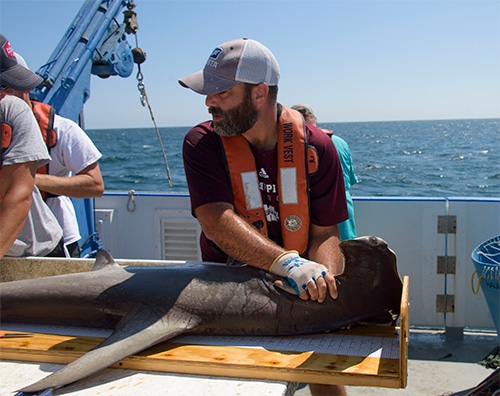As a father of three, Marcus Drymon has watched his fair share of Disney movies, but he never imagined his work as an associate Extension professor at Mississippi State University would land him a spot on a National Geographic feature documentary on Disney+.
“Being part of this show was a blast,” said Drymon.
The marine biologist, more often referred to as a “shark scientist,” is stationed at MSU’s Coastal Research and Extension Center in Biloxi. In late 2022, Drymon’s work caught the attention of a production company that contacted him about a documentary, which led to multiple conversations about his research over the next year.
“Sharks are fascinating,” said Drymon, whose interest in the species began at a young age. “I’ve been fortunate to work on sharks at a variety of institutions, but nowhere like Mississippi State University. At MSU, I receive tremendous support from leadership which creates an exceptional working environment that cultivates success.
“Working with the production company was easy. They had a detailed plan for every step of the process. The best part of working with them was their desire to stay true to the science. For example, all of the information I shared was fact-checked,” said Drymon.
“Shark Beach with Anthony Mackie,” released this month, takes viewers to Lake Pontchartrain where Mackie and Drymon meet on a pier to fish for bull sharks. The species can live in fresh or salt water—a benefit for the sharks but often a problem for anglers.
“My particular interest in this documentary was shark depredation, a human-wildlife conflict that’s on the mind of anglers across the Gulf of Mexico. If there’s one thing I’d like to be highlighted from this documentary, it’s the fact that depredation is complicated,” said Drymon.
Shark depredation is when sharks eat all or part of a hooked fish before the angler can reel in their catch.
“We don’t have a great feel for which parts of Lake Pontchartrain they [bull sharks] like the best. What are the inlets; where they might be coming in; where are the areas where the water is just right?” Drymon explained to Mackie during the documentary as they stand on the pier fishing.
By catching, tagging and releasing sharks, Drymon is able to go below the surface to better understand the role sharks play in maintaining healthy coastal ecosystems and the factors that determine their distribution and movement patterns.
A first in his lifetime, Mackie reels in a 30-inch baby bull shark. Even though it is one of 10,000 catches for Drymon over the past 15 years, viewers can hear him say, “That’s amazing,” as he unhooks the shark. For Drymon, the job never gets old.
After Drymon performs a quick procedure to implant a transmitter, Mackie releases the shark back into the water. The tagged shark joins thousands of others that help provide data that can ultimately be used to best manage and conserve the species.
“Completing the circle,” Drymon said to Mackie as the two fist bump.
Maybe not a fairytale ending like a typical Disney show, but it’s another step to reducing shark depredation.
And for Drymon’s three children, they think it’s pretty cool to see their dad on TV.




